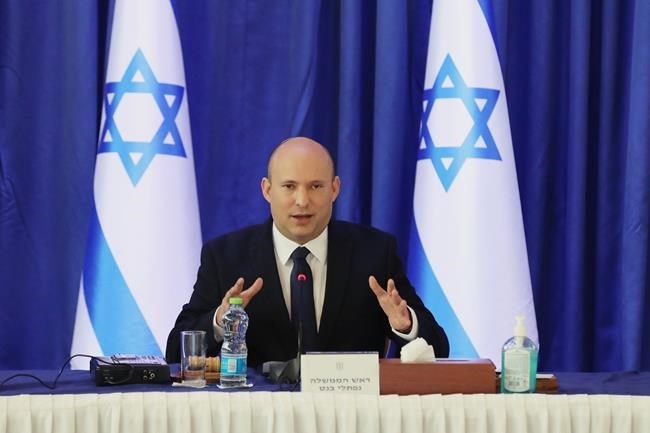CAIRO (AP) — Israeli Prime Minister Naftali Bennett is to visit Egypt on Monday for talks with Egyptian President Abdel-Fattah el-Sissi in the Red Sea resort of Sharm el-Sheikh, Egypt's office of the presidency said.
There was no immediate confirmation of the meeting from the Israeli government.
It would be the first official visit by an Israeli premier since 2010, when then-President Hosni Mubarak hosted a summit with Benjamin Netanyahu, Palestinian President Mahmoud Abbas and U.S. Secretary of State Hillary Clinton. Less than a year later, Egypt was rocked by a popular uprising that toppled Mubarak.
Bennett and the Egyptian president are expected to discuss bilateral relations, efforts aimed at reviving the peace process as well as other regional and international developments, said a statement issued by el-Sissi’s office.
Over nearly a decade, Israeli officials have held covert meetings with their Arab counterparts, some of which were only announced after the fact. Egypt in 1979 became the first Arab country to reach a peace agreement with Israel.
The meeting will be a boost for Bennett, Israel’s new prime minister who took office in June and is still trying to establish his foreign-policy credentials. His predecessor, Netanyahu, billed himself as a global statesman but never was able to hold a public meeting with the Egyptian president.
The tense situation in the Gaza Strip is likely to top the agenda of Monday’s meeting.
Israel, with Egypt's help, has maintained a tight blockade over Gaza since the Palestinian militant group Hamas overran the territory in 2007 in an effort to prevent it from importing weapons. Israel and Hamas have fought four wars, most recently in May, and Egypt often serves as a mediator between the two enemies. In the last war, it successfully brokered a cease-fire that brought the fighting largely to a stop.
Egypt has been trying to broker a long-term cease-fire between Israel and Hamas, but those efforts appear to have run into trouble in recent weeks. Hamas has demanded a lifting of the blockade, which has devastated Gaza’s economy. Israel wants Hamas to free two captive Israeli civilians and to return the remains of two dead soldiers killed in a 2014 war.
With conditions deteriorating in Gaza, Hamas has grown increasingly impatient. In recent weeks, it has staged a number of violent demonstrations along the Israeli border and launched dozens of incendiary balloons across the frontier, setting off a series of wildfires in southern Israel.
Israel has praised el-Sissi’s government for its help over the years, and in turn allowed Egyptian forces greater freedom near the border to fight Islamist insurgents in the Sinai peninsula.
Egypt's government, however, usually walks a careful line with its own citizens, who deeply oppose Israel’s policies toward the Palestinians. As Egyptian and Israeli officials quietly collaborate on security, they are rarely strongly critical of Israel in public — though the government gives free rein to prominent personalities aligned with the government to denounce Israel or portray it as the enemy in the media.
Earlier this month, el-Sissi held talks with King Abdullah II of Jordan and Abbas in Cairo where they stressed the need to revive the elusive two-state solution to the Palestinian-Israeli conflict. The three leaders said the Palestinians have a right to an independent state, with east Jerusalem as its capital, a plan that Israel staunchly opposes.
Most recently, as tensions rose in the Gaza Strip, the escape of six Palestinian inmates from a maximum-security Israeli prison elicited praise from many Egyptians.
Over the weekend, Israel caught four of the fugitives. In response, Palestinian militants in Gaza launched several rockets into Israel, prompting retaliatory Israeli airstrikes.
Noha Elhennawy, The Associated Press




